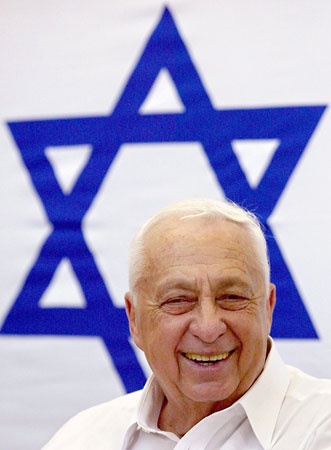Sharon, Ariel
prime minister of Israel
byname Arik Sharon
born February 26, 1928, Kefar Malal, Palestine 【now in Israel】
 Israeli general and politician, whose public life was marked by brilliant but controversial military achievements and political policies. One of the chief participants in the Arab-Israeli wars, he was elected prime minister of Israel in 2001.
Israeli general and politician, whose public life was marked by brilliant but controversial military achievements and political policies. One of the chief participants in the Arab-Israeli wars, he was elected prime minister of Israel in 2001.Sharon received military training early in life, becoming part of a Jewish defense force that protected kibbutzim (collective-farming settlements) from raids by Bedouin and neighbouring Arab (Arab-Israeli wars) villagers. During the Israeli war of independence in 1948–49, he led one of the crack units, and after the war he was involved in intelligence and reconnaissance work and was in command of a controversial attack on a Jordanian village in 1953. During the 1956 Suez Crisis, Sharon captured the strategic Mitla Pass on the Sinai Peninsula, again garnering praise for his military ability and criticism for his headstrong leadership. After the crisis he studied military theory at Staff College in Camberley, England, and law at Tel Aviv University, graduating with a law degree in 1966.
Sharon was made a major general in 1967, a few months before the Six-Day War in June, in which he once again captured the Mitla Pass in a lightning-quick assault. He resigned from the Israeli army in July 1973 but was recalled for the Yom Kippur War of October 1973, in which he spearheaded the Israeli counterattack westward across the Suez Canal into Egypt.
Amid charges of impulsiveness, uncontrollability, and dogmatism, Sharon made many enemies and was kept from the top army position that his military exploits might otherwise have gained for him. He was instrumental in the formation of the Likud party in September 1973 and became a member of the Knesset (Israeli parliament) that year. He was adviser (1975–77) to Prime Minister Yitzhak Rabin (Rabin, Yitzhak) before joining the Likud administration of Prime Minister Menachem Begin (Begin, Menachem) in 1977 as minister of agriculture in charge of settlements. In that position he supported the construction of Jewish settlements in occupied Arab territories.
Begin appointed Sharon minister of defense in June 1981, and he was the principal architect of Israel's 1982 invasion of Lebanon, a war that swept Palestinian guerrillas from southern Lebanon but also worsened that country's civil war. After militia members of Israel's Lebanese Phalangist allies committed massacres at two Palestinian refugee camps in Israeli-occupied Beirut, Israel convened a commission of inquiry, which did not find Sharon directly responsible for the massacres but did hold him indirectly responsible for failing to take action to prevent the bloodshed. He resigned as defense minister in 1983, although he continued to hold cabinet positions over the next decade, as minister of industry and trade (1984–90) and minister of construction and housing (1990–92). Under this second portfolio he continued his earlier policy of promoting intensive Israeli settlement in occupied territories.
In 1996 Prime Minister Benjamin Netanyahu (Netanyahu, Benjamin) created the cabinet post of minister of national infrastructure for Sharon. Two years later Sharon was named foreign minister, and in 1999 he succeeded Netanyahu as Likud party leader. Controversy, however, continued to follow Sharon. In late 2000 his visit to Jerusalem's Temple Mount to press Israeli rights of sovereignty over a site viewed as holy by both Jews and Muslims outraged Palestinians and sparked widespread violence, seriously undermining Israeli-Palestinian peace talks.

 In December 2000 Prime Minister Ehud Barak (Barak, Ehud) resigned his post, and a new election was scheduled for February 2001. Sharon announced his candidacy, and, disillusioned with Barak's inability to halt the fighting, Israelis voted Sharon into office by the largest margin in Israeli history. Violence continued, however, and in late 2003 Sharon unveiled a plan that called for the withdrawal of Israeli settlers and soldiers from the Gaza Strip and part of the West Bank. Despite opposition from within Likud, Israel completed the pullout in September 2005. Two months later Sharon left Likud and formed a centrist party, Kadima (“Forward”). In January 2006, however, Sharon was debilitated by a massive stroke, and power was transferred to Deputy Prime Minister Ehud Olmert (Olmert, Ehud), who became acting prime minister.
In December 2000 Prime Minister Ehud Barak (Barak, Ehud) resigned his post, and a new election was scheduled for February 2001. Sharon announced his candidacy, and, disillusioned with Barak's inability to halt the fighting, Israelis voted Sharon into office by the largest margin in Israeli history. Violence continued, however, and in late 2003 Sharon unveiled a plan that called for the withdrawal of Israeli settlers and soldiers from the Gaza Strip and part of the West Bank. Despite opposition from within Likud, Israel completed the pullout in September 2005. Two months later Sharon left Likud and formed a centrist party, Kadima (“Forward”). In January 2006, however, Sharon was debilitated by a massive stroke, and power was transferred to Deputy Prime Minister Ehud Olmert (Olmert, Ehud), who became acting prime minister.